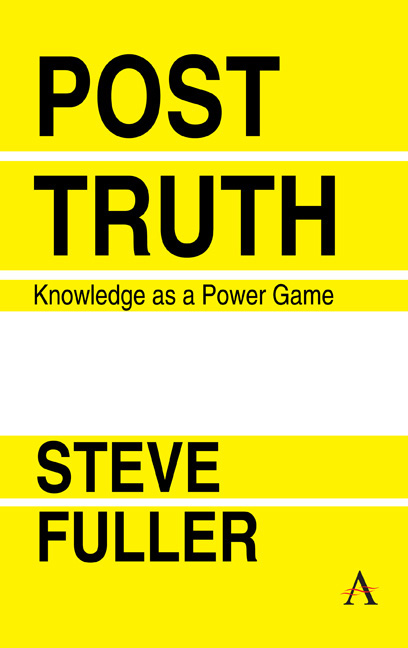Book contents
- Frontmatter
- Dedication
- Contents
- Acknowledgements
- Introduction: Science and Politics in a Post-Truth Era: Pareto's Hidden Hand
- 1 Brexit: Political Expertise Confronts the Will of the People
- 2 What Philosophy Does and Does Not Teach Us about the Post-Truth Condition
- 3 Sociology and Science and Technology Studies as Post-Truth Sciences
- 4 The Post-Truth about Academia: Undiscovered Public Knowledge
- 5 Science Customization: A Project for the Post-Truth Condition
- 6 The Performance of Politics and Science on the Playing Field of Time
- 7 Forecasting: The Future as the Post-Truth Playground
- The Argument in a Nutshell
- Glossary
- References
- Index
7 - Forecasting: The Future as the Post-Truth Playground
Published online by Cambridge University Press: 14 July 2018
- Frontmatter
- Dedication
- Contents
- Acknowledgements
- Introduction: Science and Politics in a Post-Truth Era: Pareto's Hidden Hand
- 1 Brexit: Political Expertise Confronts the Will of the People
- 2 What Philosophy Does and Does Not Teach Us about the Post-Truth Condition
- 3 Sociology and Science and Technology Studies as Post-Truth Sciences
- 4 The Post-Truth about Academia: Undiscovered Public Knowledge
- 5 Science Customization: A Project for the Post-Truth Condition
- 6 The Performance of Politics and Science on the Playing Field of Time
- 7 Forecasting: The Future as the Post-Truth Playground
- The Argument in a Nutshell
- Glossary
- References
- Index
Summary
Introduction: The Alchemy of Deriving Truth from Error
In the past, under the inspiration of Popper, I have argued that fundamental to the governance of science as an ‘open society’ is the right to be wrong (Fuller 2000a: chap. 1). This is an extension of the classical republican ideal that one is truly free to speak their mind only if they can speak with impunity. In the Athenian and the Roman republics, this was made possible by the speakers – that is, the citizens – possessing independent means which allowed them to continue with their private lives even if they are voted down in a public meeting. The underlying intuition of this social arrangement, which is the epistemological basis of Mill's On Liberty, is that people who are free to speak their minds as individuals are most likely to reach the truth collectively. The entangled histories of politics, economics and knowledge reveal the difficulties in trying to implement this ideal. Nevertheless, in a post-truth world, this general line of thought is not merely endorsed but also intensified.
Behind the right to be wrong is a sense that humanity has made progress over its animal ancestors by our ideas dying in our stead (Fuller 2007b: 115– 16). The long- term trend has been certainly towards minimizing the personal consequences of error. Consider three indicators. First, fewer people are put to death, or even tortured, for holding heretical beliefs. And when such things do happen, the violence committed – even if purportedly in the public interest – is roundly condemned. To be sure, whenever possible, heretical views are put to a strict ‘scientific’ test, the outcome of which may humiliate one of the parties. But that is as far as it goes. Second, environments have been made increasingly ‘smart’ so as to lower the likelihood that people will die or be severely harmed simply as a result of getting lost or misusing an artefact. Third, law enforcement's objective has gradually shifted from stopping to preventing crime, and even punishment has been increasingly interpreted in terms of compensation rather than retribution or even rehabilitation.
In all these cases, the propensity for error is far from outright eliminated. In some cases, it might even be encouraged.
- Type
- Chapter
- Information
- Post-TruthKnowledge as a Power Game, pp. 151 - 180Publisher: Anthem PressPrint publication year: 2018



